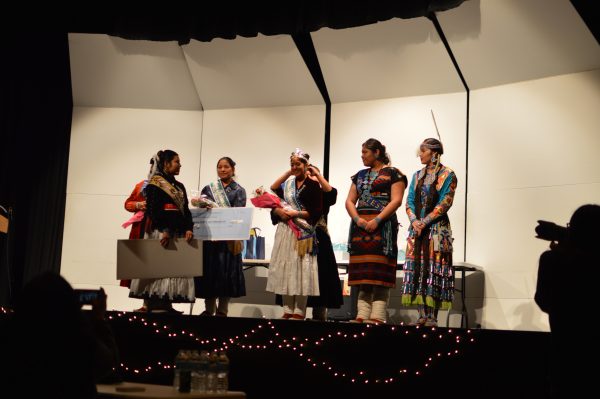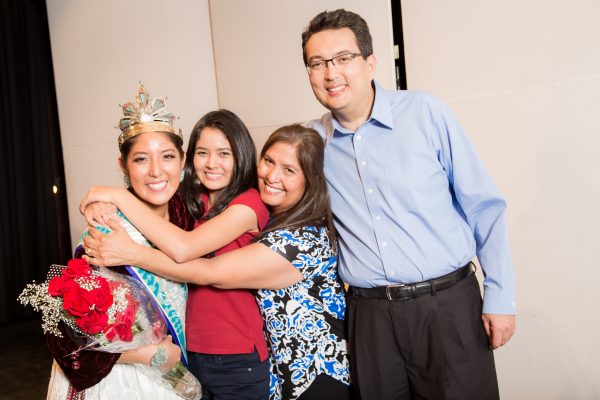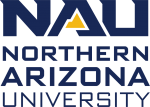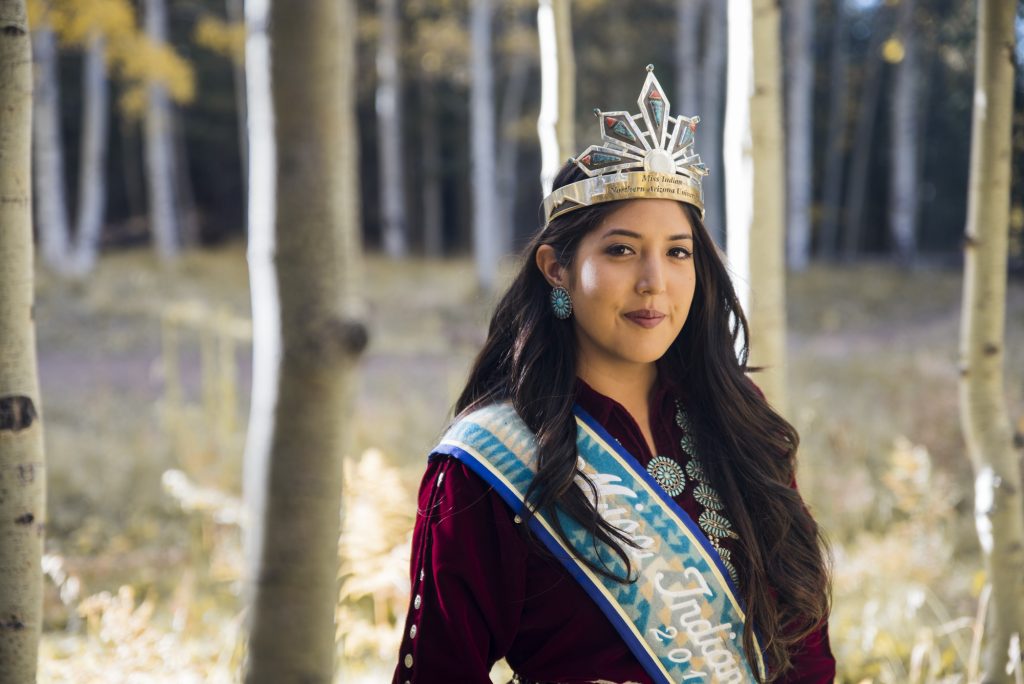May 8, 2019
For much of her life, Emile Eich didn’t feel Navajo enough.
For the NAU senior, who graduates Saturday with a degree in psychology, that all changed one fall day in 2016.
It wasn’t, though, the day Eich, then a sophomore who’d come to NAU because of its proximity to the Navajo Nation and the opportunities to learn about her heritage, signed up for Navajo 101, started working at the Office of Indigenous Student Services (OISS) or mentoring other Native American students. It wasn’t the day she learned her introduction—a recitation of her parents (her mother is Navajo, her father is Vietnamese), their parents, their parents and their parents that conveyed to listeners how closely they were connected. It wasn’t even the day in November when she stood on stage, wearing traditional Navajo dress and accessories, that she was named Miss Indigenous NAU.
No, the day Emile Eich felt not just Navajo enough but just plain enough was in preparation for that pageant when, frustrated that she didn’t speak Navajo or know how to tie her moccasins or hair or know the culture, traditions and lore of her ancestors, she sought out a medicine man at her mother’s traditional home of Wide Ruins. She told him she didn’t know if she was Native enough to represent the entire Indigenous community.
“I was talking to him about our stories related to our moccasins and other stuff that I had not learned—I talked to him about the problems facing my identity,” she said. “He told me that, instead of thinking about myself as not being able to be a part of any world, or being an outsider, to instead think of myself as being a bridge to both of those cultures.”
The light bulb went off in Eich’s head. Her identity, instead of being a struggle between two halves, was something much more beautiful and meaningful to her. It gave her the strength to stand on that stage.
“I feel like that’s a very Westernized concept, that you’re only ‘half’ Navajo,” she said. “As a whole person, I’m of those two cultures.”
Finding herself
Eich came to NAU in part to meet the other half of herself—the Navajo side that she never really knew growing up. Her mother, who is Navajo, was adopted as a child and didn’t know her family or their culture, traditions and way of life growing up. Although Eich and her family reconnected with that part of their family when she was a teenager, she was still a stranger to her Navajo identity.
“Weirdly enough, everything that I’ve learned about Native Americans, about myself, when I was younger was from history books, and we all know how inaccurate they are,” she said. “That was my prior perspective on myself. I had to learn it through a western lens. It wasn’t until I came here that I started learning about the treaties and really going onto the reservation and talking to people that I gained a full understanding.”
She called this process decolonization—deconstructing what she thought she knew and learning from the source. She learned about Mother Earth and the importance of giving instead of taking.
“It’s really changed the way I think, the way I do things, the way I see the world,” she said. “I’m just decolonizing and going back to the traditional ways of thinking and practices. That’s a lifelong journey.”
She talked to faculty members, to other students, to staff members at the Native American Cultural Center about everything—family, health disparities, identity, moccasins, their history, their present, their future. The more Eich talked, the more she felt pulled in a different direction. She came to NAU with an interest in business law. Four years of meeting with Native people and doing research on public health among indigenous communities led her to a desire to help her people. She’s now leaning toward a career in research or tribal law.
At every opportunity, in fact, Eich sought out ways to help her people, including through her participation in NAU’s Minority Health and Health Disparities International Research Training program. She spent 10 weeks in Auckland, New Zealand, working with an Indigenous researcher doing research on the Maori, the native people of the Pacific nation. She saw a different approach to research there. Many researchers craft a question they want to study and tell the community they’re studying. Eich’s mentor, who was part of the community, asked her neighbors what questions they had and how her research could help them. Common themes that emerged from the research Eich did included accepting kaitiakitanga (guardianship) toward water; intertwining their identity with rivers and oceans; and believing that community involvement and collaboration are needed for successful conservation and restoration of water.
“As an Indigenous researcher, Emile was able to connect with the Maori population by reflecting on her Indigenous culture to build an understanding of the challenges that the Maori are facing in regard to translating Indigenous culture to be understood by Westerners,” said Simon Chief, Eich’s mentor and formerly a program coordinator in OISS.
At NAU, Eich also found a way to combine her discovery of her Native American heritage with her love of the outdoors. She worked at Outdoor Adventures and took students on camping and rafting trips; being in nature, she said, was one of the highlights of her college career. The more she learned, the more she educated the students with whom she went on trips, asking if they knew whose land they were on, who used to live there, who lives there now and their thoughts on ideas like whether land and resources should even be owned by individuals. She did this on a recent whitewater rafting trip through the Grand Canyon with her coworkers.
“I feel like their eyes really opened after some of these trips,” she said. “That’s what happened to me my freshman year. I went on a couple of trips and my professors really honed in on these questions. It was eye-opening.”
Miss Indigenous NAU and beyond
With her experiences of feeling left out in mind, Eich approached her year as a representative for the Indigenous community with a platform dedicated to creating cultural awareness and embracing multiculturalism. She also encouraged youth to pursue their dreams and never turned down any invitation to visit reservations or attend events, even when they were outside her comfort zone, Chief said—up to and including being invited to judge a sheep butchering competition. She embraced the role of Miss Indigenous NAU with the same enthusiasm and commitment as she did her peer mentorship and other responsibilities at NAU.

“Emile is a naturally talented woman with exceptional leadership qualities committed to lifelong learning,” Chief said. “She has developed a passion for working with her people and giving back to the Indigenous community.”
Eich admits she’s privileged; she’s had a great time at NAU and is leaving feeling so empowered to chase her dreams. She has to think for a minute about her biggest challenge—“finding my identity was the hardest thing, but you already know how that turns out”—but then she remembers her most difficult time. Eich had faced her identity crisis and found out who she was and was proud of that woman who saw herself as a bridge that connected cultures, but she found that hard-fought confidence challenged during the Navajo Nation elections. One of the candidates for vice president was half Navajo and half Vietnamese, and she suddenly found her identity in the spotlight. Seeing comments on Facebook, seeing video of the candidate being told by a group of veterans that they would never accept him because of his heritage—the heritage that she shared—was brutal.
“For an individual who wants to do great things and wants to be in a leadership position for the Navajo Nation, it was hard,” she said. “You want to do great things and to know there are community members who don’t agree—that was a rough time and something that will always be with me.”

As hard as it was, though, Eich also has the opportunity to see both perspectives. Many of the Navajo Nation veterans fought in the Vietnam War. They saw the Vietnamese as the enemy. On the other side, Eich’s grandmother lost loved ones in the war and her community was devastated. Both populations were impacted, and miscommunication, misunderstanding and eventually fear and hatred grew. Her background is complicated not just because she has dual heritage. The specific heritage Eich claims has decades of history.
What’s next
After commencement, Eich is moving to Salt Lake City, Utah, for the summer. She was accepted into the Native American Summer Research Internship through the University of Utah School of Medicine and will be studying adipose tissues in connection with diabetes among indigenous populations. It’ll be a change from the research she’s done at NAU, which is about diabetes but from a behavioral health perspective. Up to now, she’s observed and done surveys and interviewed people. This summer, she’ll have her eyes on a microscope.
For now, she’s enjoying her final days at NAU. At the Indigenous Convocation Thursday and commencement on Saturday, both of Eich’s grandmothers will be there. Her father’s mother will attend in traditional Vietnamese garb, her mother’s mother will be there in Navajo dress. She doesn’t know much English, but the only words she really needs to understand that day are “Emile Eich.”

Heidi Toth | NAU Communications
(928) 523-8737 | heidi.toth@nau.edu



